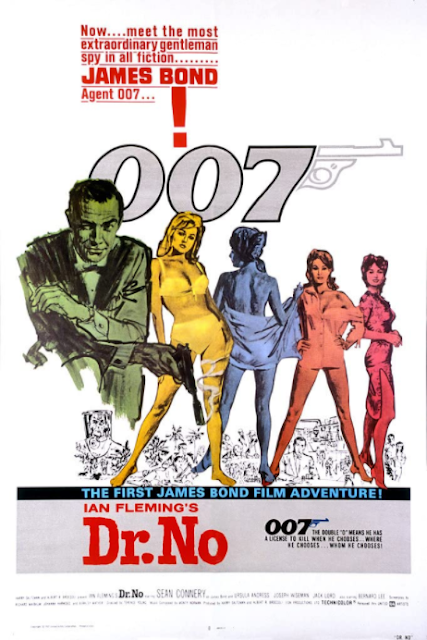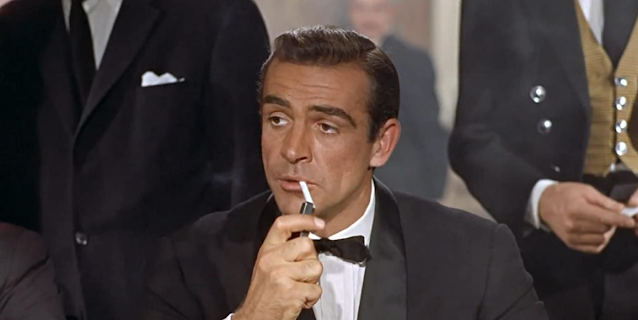Dr. No
Dr. No (1962)
Director: Terrence Young
Writers: Richard Maibaum (screenplay), Johanna Harwood (screenplay), Berkley Mather (screenplay), Ian Fleming (novel)
Cast: Sean Connery, Ursula Andress, Joseph Wiseman, Jack Lord, Bernard Lee, Anthony Dawson, Zena Marshall, John Kitzmiller, Lois Maxwell
Synopsis:
Super-spy James Bond (Connery) travels to Jamaica to investigate the disappearance of a fellow British agent. Along with CIA agent Felix Leiter (Lord) and local sailor, Quarrel (Kitzmiller), Bond learns of the mysterious scientists Dr. No (Wiseman) who lives on his own private island, Crab Key. While investigating Crab Key, Bond discovers a plot by Dr. No to sabotage NASA rockets launched out of Cape Canaveral and learn of the shadowy organization, known as SPECTRE. With the help of local shell diver Honey Ryder (Andress), Bond must stop No's plan before the next rocket launch.
First Impressions:
In a first for this blog, I have no first impressions of this movie, as I've never seen it. While I generally don't purchase movies I've not seen on DVD or Blu-Ray, in this case, it was part of the James Bond boxed sets released in the early 2000s. I'm not sure why I never got around to watching this one since I've had it for years. It's probably because when I'm in the mood for a Bond flick, the Connery ones are usually the last ones I go for. This is probably because I grew up watching the Moore and Dalton films, so they have a more nostalgiac draw for me. Anyway, I'm excited to view this film for the first time and see how much has changed over the last 60 years.
Story/Direction:
"East, West - just points of the compass, each as stupid as the other."
I'm going, to be honest here, there are things that I liked about this film's story and things I didn't like at all. On the positive side, the stakes are overall pretty low in comparison with many other Bond films. There's no plot for world domination or to flood the silicon valley or anything like that. It's a simple Cold War-era spy thriller. The investigation of a missing agent leads to revealing a larger, more nefarious plot, and that's about it. The simplicity makes for a good thriller. However, the plot may have been a bit too simple. It's never really explained to my satisfaction why Dr. No wants to disrupt NASA launches. Was it to just piss off the U.S. or start World War III? We're never really told all that well, and it seemed to me that the evil plot was just a way for SPECTRE to troll the U.S. I know I'm basically contradicting myself here, but while the film is well served by not getting too outlandish in the plot, there just wasn't enough meat to craft a really compelling story.
From a directorial standpoint, I think Terrance Young did a fine job laying the foundation for cinema's most enduring franchise. Unlike other Bond films, Young had to establish these characters for an audience that may not have read Flemming's novels. For the most part, what he set up in this film has lasted through nearly 60 years and countless cast changes. The movie was paced pretty well, but I thought it started to drag a bit in the second half, and I think maybe it would've been nice to have a few more action scenes tossed in.
Acting:
As with my review for The Living Daylights, I'm going to do this section a bit different from what I normally do by splitting things up into usually the three main roles in any Bond film: The Bond, the Bond Girl and the Bond Villain.
The Bond: Well, what can you say about Sean Connery? He did it first, and he did it the best. While he's not my favourite Bond (go Dalton!!), I certainly believe that he was the best actor to play the role. He embodied the cold, ruthless killer depicted in Flemming's original works and gave him a likeable, more mischievous side. Even though he was the first to play the role, I think he combines well in other Bond actors into the role. He had the wit of Roger Moore, the Charm of Pierce Brosnan, the intensity of Dalton, and Craig's raw strength. He set the standard, and everyone who came after merely dwells in his shadow. R.I.P Sir Sean, you will be missed.
The Bond Girl: Whew, one area that I think Bond movies have improved upon over the decades, depicts the female leads. Obviously, this film was made in a different time, and there was a different mindset but, the Bond girls of these early movies weren't exactly great roles for the actresses cast in them. I'm not sure if Ursula Andress is a good actor or not because she really isn't given a hell of a lot to do. Her only job seems to be to stand there and look sexy in a bikini. Like I said, though, it was a different mindset back then, and fortunately, the caretakers of the series have seen fit to evolve that point of very over the ensuing decades.
The Bond Villain: I take a small measure of national pride in knowing that the first-ever Bond villain was a Canadian by birth. Unfortunately, that's all that I liked about this portrayal as I found Wiseman's turn as Dr. No to be fairly wooden. I think I see what he was going for by making the character seem aloof, but it really just made for a boring villain. Fortunately, subsequent entries in the series corrected this (sometimes over-corrected).
Visuals:
As the film was made in 1962, the visual effects don't look great to a modern viewer. Fortunately, there aren't many visual effects to be seen, with only a few explosions and some rear projection work. The latter is probably my biggest beef with the film's visuals as there is a lot of needless rear projection work, particularly when Bond is driving. Maybe it's just my ignorance about how movies were made in the 60s and what technology was available. Still, I guess they didn't have the capability to do a face-on shot of Connery driving in a convertible. It looks noticeable fake, they couldn't even get a fan to blow Connery's hair a bit to make it look like he was moving fast.
Score/Music:
Again, with Bond movies, I do this section a little different and focus on the "Bond Song," which for most of 007's films provide the basis for the rest of the score. There wasn't a title song that we know and love from the subsequent films in the series for Dr. No. The title song was literally the James Bond theme, composed by Monty Norman, who also did the rest of the score. Now, I think the James Bond theme is an iconic piece of music known to just about everybody, even those who aren't fans of the series. However, the theme is entirely overused in this film to the point where I got a bit sick of it. Honestly, it seemed like it would pop up every few minutes. I love the theme, I really do. I also love ice cream, but I don't love it when it's being shoved down my throat. That's kind of what I feel like in regards to the music for this film.
Action:
Another point where this film differs from its sequels is in the action department. While most of the movies that came after would easily be considered "action" movies, Dr. No is decidedly not. I would classify this as more of a spy thriller than an action movie. That's not to say there isn't any action, but the filmmakers opted for more tension building scenes than flat out action. For the most part, it works, and I wonder how the series would have been viewed today if it had maintained that approach rather than shifting toward the action genre.
There is one scene that I found a bit amusing, which is one where one of Dr. No's henchmen releases a tarantula into Bond's bed as he sleeps. The film plays this up as an extremely tense moment, with Bond in grave danger. The thing is, tarantulas are pretty harmless to humans, and 007 wasn't in any real danger. I'm assuming the filmmakers just fudged reality a bit in the hopes that a big-ass spider would freak the audience out enough that they wouldn't question it. I just found it kind of funny.
Final Verdict:
Well, what can I say about Dr. No? It's certainly not my favourite of Bond's cinematic outings, but it's not the worst either. For me, I'd place somewhere in the lower middle of my Bond film rankings. I still have to give it props for being the first entry in a cinematic legacy. Fans of the series who want to get a better idea of its origins, as well as cold-war era spy thrillers, should definitely give it a try.








Comments
Post a Comment